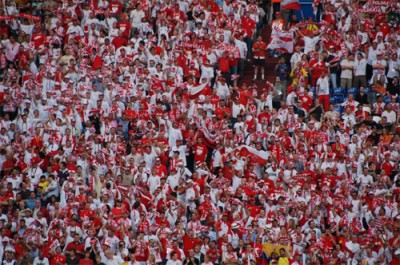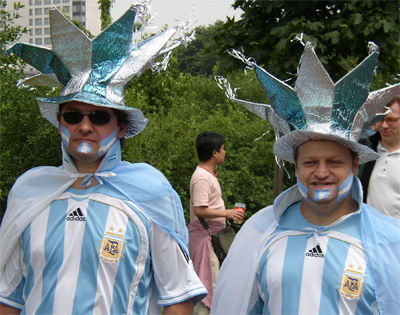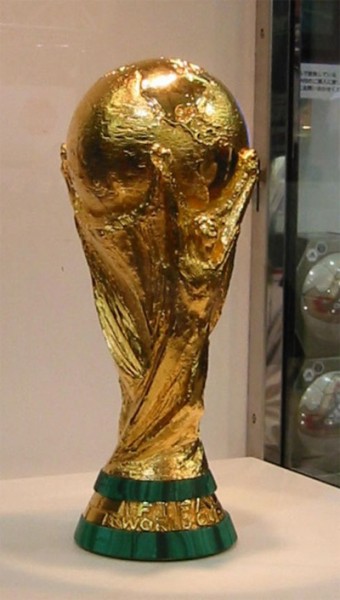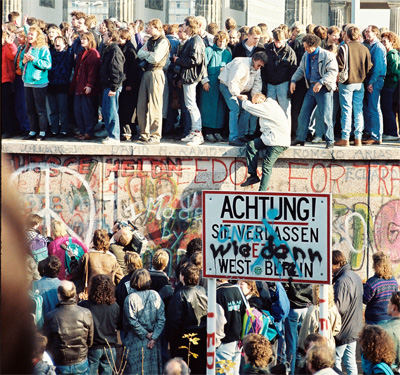Why America Should Care About The World Cup
It is a global phenomenon unlike any other. Children from Ghana to Denmark dream of participating in this event, and its following is unparalleled. Viewer numbers are staggering – the cumulative television audience in 2006 was estimated at over 26 billion. When it is played in South Africa this year, it will draw representatives from 6 continents and Oceania.
It is the FIFA World Cup, the biggest stage for the most popular sport in the world.

That is, the world outside of the U.S. Although soccer is known as the “universal language,” it has never had anywhere close to the appeal in this country as the “other” football. Many Americans simply don’t care. They see the game as soft (I grew up in Indianapolis watching Reggie Miller make a career of acting his way to the foul line, but even he would roll his eyes at the some of these soccer flops) or un-American. The rules for the most popular sports in the U.S. – football, baseball, basketball – have more or less been written here, which can’t be said for soccer; and a game with no hands allowed seems to clash with the ideals of the hands-on, blue-collar American worker.
However, like it or not, soccer has arrived in this country. Many Americans enjoy watching and playing the sport, and youth leagues have even become so commonplace they have added a new term to the American lexicon: “soccer mom.” Increasing participation in the sport has inevitably led to the U.S. having better caliber players, and, for possibly the first time ever, our country has a team that is expected to make some noise in the tourney.
It might not be such a bad thing. For one thing, soccer is emblematic of the “melting pot” that our nation is supposed to be. Americans loved the movie “Remember the Titans” because it showed how sports transcended and broke down the racial barriers of segregation. Soccer is breaking those same barriers for Hispanics and other ethnicities on high school teams all across the country. Furthermore, any sport that consists of as much running as soccer for 90+ minutes should be irresistible to Americans who love tough sports. And, like basketball, soccer is a semi-contact sport; teams can be just as physical, intimidating, and/or dirty.

American should also love the passion within soccer. After all, there are three areas of our lives where fanaticism is accepted, and sometimes even encouraged: patriotism, religion, and sports. Considering that A) soccer players are in the event to honor their country, and B) it is the most widely followed sporting event on the planet, the World Cup blends two of these areas on an unmatched scale. There are few stages on which human emotions play so fully: jubilation in victory; agony in defeat; insanity among fans; love among teammates. This event epitomizes what sport is all about. What can be more entertaining than passion?
Americans should appreciate a team that has earned respect from the rest of the world the hard way – through grit, toughness, and skill. It shouldn’t be hard to fall in love with this team.
The talent is there: America stunned everyone by finishing second in the recent Confederation’s Cup, beating #1 ranked Spain and losing a 3-2 nail-biter to the legendary Brazilians in the final.

We also seem to have luck on our side. There seems to be a consensus among the experts that the U.S’s first round draw (England, Algeria, and Slovenia) was relatively favorable. The U.S., ranked 14th in the world, will be heavily favored against Algeria (26) and Slovenia (31), and we shouldn’t be shocked if they upset the 9th-ranked Brits. A win against any two of these three should be enough to advance them. They could even win all three opening round games (We are, of course, knocking on wood very heavily).
This is uncharted territory for us. We know international competitions – we are accustomed to bringing home tons of medals every Olympics; and we know about big-time sporting events – the Super Bowl, NBA Finals, Indy 500, etc.; but we don’t know as much about the combination of the two that we will find in South Africa. A look at the history of the tourney tells us to expect the unexpected.
There have been iconic moments – when Brazil effortlessly passed the ball around Italian defenders in ’70, building momentum pass by pass until they finally blasted it into the net.
Or when Argentinean Diego Maradona took the ball from his own half, single-handedly dribbled past at least five English defenders, and scored in ’86.
There have been more dubious moments as well – Zinedine Zidane’s head-butt and subsequent ejection that probably cost France the ’06 Cup; Maradona’s “Hand of God” in that same ’86 game.
At certain points, the World Cup has become more than a sport as it reflected world politics.

- The tourney featured only 15 teams in ’38, because Germany invaded what would have been the 16th. There were none in ’42, because Germany had proceeded to invade a whole lot of other countries; and none in ’46, because the world was trying to forget the Germans.
- There was the “Football War,” when a 4-day armed military conflict erupted between El Salvador and Honduras following a 1969 qualifying match. Although there were bigger social issues involved, the riots after this game were the last straw for the two countries; igniting a war in which thousands died and 300,000 lost their homes.
- Some believe Maradona’s ’86 heroics were spurred on by England’s engagement in the Falkland Islands conflict.
- West Germany won the World Cup in 1990. Considering that the Berlin Wall fell less than a year earlier, this victory has to rank as one of the most inspired performances of all time. It was also symbolic of what was to come a few months later: The Germans hoisted the Cup on July 8th in one of the greatest moments in the history of German sports, and East and West Germany unified on October 3rd in one of the greatest moments in the history of the free world.